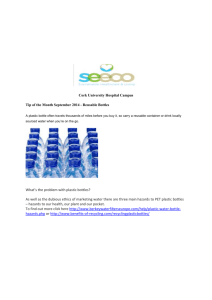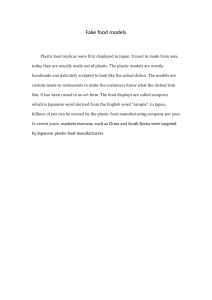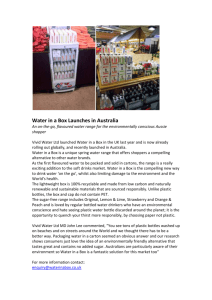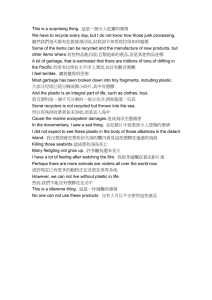Corporate Social Responsibility for Child Welfare & Sustainability
advertisement
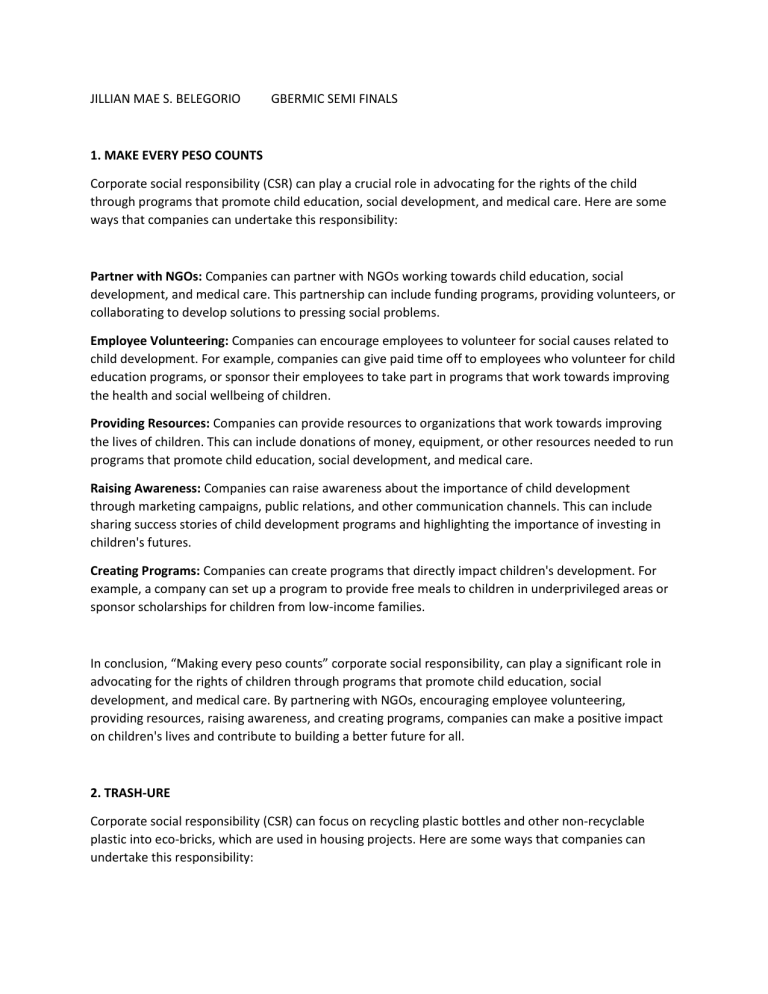
JILLIAN MAE S. BELEGORIO GBERMIC SEMI FINALS 1. MAKE EVERY PESO COUNTS Corporate social responsibility (CSR) can play a crucial role in advocating for the rights of the child through programs that promote child education, social development, and medical care. Here are some ways that companies can undertake this responsibility: Partner with NGOs: Companies can partner with NGOs working towards child education, social development, and medical care. This partnership can include funding programs, providing volunteers, or collaborating to develop solutions to pressing social problems. Employee Volunteering: Companies can encourage employees to volunteer for social causes related to child development. For example, companies can give paid time off to employees who volunteer for child education programs, or sponsor their employees to take part in programs that work towards improving the health and social wellbeing of children. Providing Resources: Companies can provide resources to organizations that work towards improving the lives of children. This can include donations of money, equipment, or other resources needed to run programs that promote child education, social development, and medical care. Raising Awareness: Companies can raise awareness about the importance of child development through marketing campaigns, public relations, and other communication channels. This can include sharing success stories of child development programs and highlighting the importance of investing in children's futures. Creating Programs: Companies can create programs that directly impact children's development. For example, a company can set up a program to provide free meals to children in underprivileged areas or sponsor scholarships for children from low-income families. In conclusion, “Making every peso counts” corporate social responsibility, can play a significant role in advocating for the rights of children through programs that promote child education, social development, and medical care. By partnering with NGOs, encouraging employee volunteering, providing resources, raising awareness, and creating programs, companies can make a positive impact on children's lives and contribute to building a better future for all. 2. TRASH-URE Corporate social responsibility (CSR) can focus on recycling plastic bottles and other non-recyclable plastic into eco-bricks, which are used in housing projects. Here are some ways that companies can undertake this responsibility: Collection: Companies can collect plastic bottles and other non-recyclable plastic waste from their operations or their employees. They can also partner with other organizations to collect waste from the community. Sorting and Cleaning: The collected plastic waste needs to be sorted and cleaned to prepare it for ecobrick production. Companies can set up facilities for sorting and cleaning the waste, or they can partner with organizations that specialize in waste management. Eco-brick Production: The sorted and cleaned plastic waste is then compressed into eco-bricks using specialized equipment. Companies can set up facilities for eco-brick production or partner with organizations that have the necessary equipment. Distribution: The eco-bricks can be distributed to housing projects or other construction projects that require them. Companies can partner with organizations that work on housing projects or other construction projects to distribute the eco-bricks. Awareness Campaigns: Companies can raise awareness about the importance of recycling plastic waste and the benefits of eco-bricks. This can be done through marketing campaigns, public relations, and other communication channels. The benefits of using eco-bricks in housing projects are numerous. Eco-bricks are cheap and easy to produce, they provide a solution for waste management, and they help to reduce the carbon footprint of the construction industry. Additionally, eco-bricks are a sustainable building material that can be used in the construction of homes, schools, and other buildings. In conclusion, corporate social responsibility can focus on recycling plastic bottles and other nonrecyclable plastic into eco-bricks, which are essential for housing projects. By collecting, sorting and cleaning, producing, distributing, and raising awareness about eco-bricks, companies can make a positive impact on the environment and contribute to building sustainable communities.

